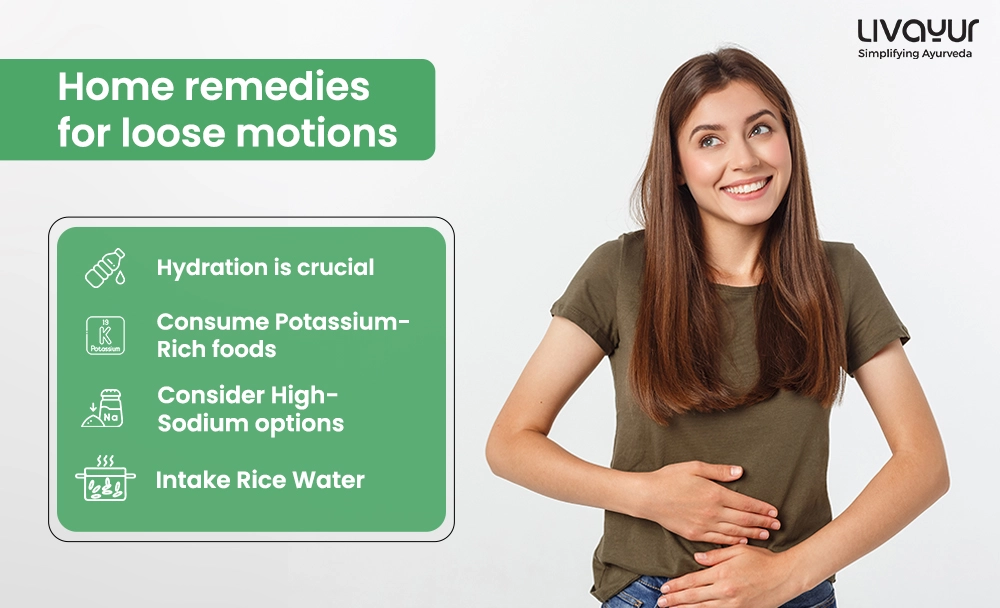
When it comes to gastrointestinal discomfort, we all have faced the inconvenience and distress caused by loose motions, also known as diarrhea. Numerous reasons, from viral infections and bacterial contamination to dietary carelessness, can lead to such discomfort. As the condition is common, the need for effective and accessible remedies is crucial. This article looks at some of the best home remedies for loose motions that have demonstrated efficiency in traditional wisdom and modern medical understanding.
Quick facts about loose motions
- Loose motions, or diarrhea, are common gastrointestinal conditions with frequent and watery bowel movements. [2]
- It can dehydrate the body due to the rapid loss of fluids and electrolytes. Rehydration is crucial to manage this condition. [2]
- Loose motions can result from multiple factors, including viral or bacterial infections, food poisoning, medications, and conditions like irritable bowel syndrome (IBS). [2]
- Diarrhea in children can be more severe than in adults, requiring specific attention and a different approach to management. [2]
- While many cases of loose motions resolve within a few days, chronic diarrhea may indicate an underlying health issue that requires medical evaluation and treatment. [2]
Why do loose motions happen?
Here are some common reasons for loose motions.
1. Viral gastroenteritis (stomach flu)
Viral gastroenteritis is the most common cause of diarrhea, commonly known as the stomach flu. This mild viral infection usually resolves on its own within a few days. [2]
2. Food poisoning
Consumption of bacteria-contaminated food or water can lead to diarrhea, also called food poisoning. [2]
3. Medication-induced diarrhea
Certain medications can trigger diarrhea as a side effect. It includes antibiotics, chemotherapy drugs used in cancer treatment, and laxatives containing magnesium. [2]
4. Medical disorders
Here are some medical disorders associated with diarrhea. [2]
a. Celiac disease
An autoimmune disorder triggered by gluten consumption.
b. Inflammatory bowel disease (IBD)
Conditions like Crohn’s disease and ulcerative colitis.
c. Irritable bowel syndrome (IBS)
A functional gastrointestinal disorder.
d. Lactose intolerance
Difficulty digesting lactose leads to issues after consuming dairy products.
e. Malabsorption syndromes
These are conditions affecting nutrient absorption in the intestines.
5. Less common causes
Some of the lesser-known causes include the following. [2]
a. Carcinoid syndrome
It is a rare condition where tumors produce hormones that affect the digestive system.
b. Nerve disorders
Disorders affecting the nerves supplying the intestines.
c. Surgical interventions
Removal of part of the stomach or small intestine.
d. Radiation therapy
Treatment with radiation, particularly to the abdominal region.
6. Travel-related causes
Individuals traveling to foreign countries may experience diarrhea due to unclean water exposure or unsafe food handling. [2]
Home remedies for loose motions
Here are some home remedies for loose motions that focus on hydration, nutrition, and dietary adjustments.
1. Hydration is crucial
Drink enough room-temperature liquids to prevent dehydration. Options include diluted fruit juices, ginger ale, coconut water, and plain water. [1]
2. Beware of caffeine and carbonated beverages
Limit caffeinated and carbonated beverages if gas or cramps are present, which may increase discomfort. [1]
3. Consume potassium-rich foods
Eat potassium-rich foods like coconut water, bananas, potatoes, and lactose-free milk or yogurt to replenish essential electrolytes. [1]
4. Consider high-sodium options
Include high-sodium foods like broth or soups to replace sodium losses and support electrolyte balance. [1]
5. Consider the “white diet”
Opt for a “white diet,” which includes bananas, rice, applesauce, soft tofu, cottage cheese, and smooth yogurt for easily digestible, gentle nutrition. [1]
6. Intake rice water
Consider trying rice water, a concoction known for its potential to soothe the digestive system and provide relief from loose motions. [1]
7. Optimal meal size and frequency
Opt for smaller, more frequent meals to ease the digestive process and manage symptoms effectively. [1]
8. Avoid triggering foods
Steer clear of greasy, spicy, highly seasoned, and overly sweet foods, which can increase digestive distress. [1]
9. Opt for mindful food choices
Exclude raw vegetables and be cautious about consuming the skins, seeds, and stringy fibers of unpeeled fruits, which may be harder to digest. [1]
10. Gradually reintroduce fiber
Gradually reintroduce higher-fiber foods, fruits, and vegetables into your diet once the symptoms of loose motions subside. [1]
11. Consider lactose consumption
Exercise caution with dairy products due to potential lactose intolerance. Opt for lactose-free milk, soy milk, or yogurt with low or no lactose content. [1]
When to see a doctor?
Seeking medical attention is crucial when symptoms accompany loose motions, as prompt intervention can mitigate potential complications. Here are key indicators that need consultation with a healthcare provider.
1. Signs of dehydration
Contact your healthcare provider urgently if you or your child exhibits signs of dehydration. Consider symptoms like decreased urine (fewer wet diapers in infants), dizziness, dry mouth, and sunken eyes. [2]
2. Unusual stool characteristics
Schedule an appointment with your provider if you observe blood or pus in your stools, black stools, or persistent stomach pain that does not decrease after a bowel movement. [2]
3. Fever and diarrhea
If diarrhea follows a fever, it is advisable to seek medical attention. Increased body temperature can be indicative of an infection that requires proper treatment. [2]
4. Travel-related diarrhea
Contact your healthcare provider if you have traveled to a foreign location and developed diarrhea. Travel-related diarrhea may be due to various pathogens that require specific medical considerations. [2]
5. Worsening or persistent symptoms
Contact your provider if the diarrhea worsens or does not improve within two days for infants or children or within five days for adults. Persistent symptoms may indicate an underlying condition that requires professional assessment. [2]
6. Prolonged vomiting in children
If a child over three months old has been vomiting for more than 12 hours, or if vomiting or diarrhea begins in younger babies, you should contact a healthcare provider. [2]
Critical aspects to know about loose motions
Understanding the following aspects of loose motions is essential for effective management.
1. Variability in severity and duration
Diarrhea happens differently in individuals, ranging from mild cases that resolve within a few days to more persistent forms. Acknowledging this variability is crucial in determining appropriate management strategies. [2]
2. Impact on well-being
Diarrhea can result in weakness and dehydration due to the loss of fluids and electrolytes. Recognizing these potential effects is essential for timely intervention and rehydration measures. [2]
3. Seriousness in babies and children
Diarrhea in babies and children demands special attention, as it can be more severe than in adults. The unique vulnerabilities of younger individuals require specialized treatment approaches. [2]
FAQs
1. What are some home remedies for loose motion in adults?
Effective remedies for loose motions in adults include staying hydrated with oral rehydration solutions, consuming the BRAT diet (bananas, rice, applesauce, toast), probiotics like yogurt, and avoiding greasy and spicy foods. Ginger tea, chamomile tea, and plain boiled potatoes are also known for their soothing effects on the digestive system.
2. What are some home remedies for vomiting and loose motion?
When dealing with vomiting and loose motions, focus on rehydration with fluids like oral rehydration solutions, ginger ale, or coconut water. The BRAT diet (bananas, rice, applesauce, toast) and easily digestible foods such as plain boiled potatoes or carrot soup can help alleviate symptoms. Probiotics, like yogurt, may aid in restoring the balance of gut bacteria.
3. How to get rid of loose motion fast
To address loose motions swiftly, consider staying well-hydrated with oral rehydration solutions and consuming easily digestible foods like the BRAT diet. Avoiding greasy, spicy foods and including probiotics, ginger tea, or chamomile tea may provide relief. However, if symptoms persist or worsen, consult a healthcare professional.
4. Can lemon juice stop loose motion?
Lemon juice, with its acidity, may help in some cases, but its effectiveness can vary. Mixing lemon juice with a pinch of salt and sugar in warm water might relieve and aid in rehydration. However, individual responses differ; consulting with a healthcare professional for persistent symptoms is advisable.
5. Which drink is best for loose motion?
Oral rehydration solutions are the best for rehydration during loose motions. Drinks like coconut water and clear broths can help replace lost fluids and electrolytes. It’s essential to avoid caffeinated and carbonated beverages and opt for beverages that are gentle on the stomach.
6. Can I eat curd in loose motion?
Yes, consuming yogurt or curd can be beneficial during loose motions. Yogurt contains probiotics that help restore the balance of gut bacteria, promoting digestive health. Opt for plain, unsweetened yogurt without additives. However, if lactose intolerance is a concern, consider lactose-free alternatives.
Conclusion
Getting relief from the discomfort of loose motions can often be possible through the home remedies we discussed above. These practical and accessible measures include everything from dietary adjustments to hydration strategies. While these remedies hold promise in alleviating symptoms, it is essential to judiciously approach the management of loose motions. Moreover, individual responses can vary. It is thus necessary to consult a healthcare professional for persistent or severe cases.
Disclaimer
This article is written from a health and wellness perspective and is not medical advice. Kindly seek the help of a certified medical practitioner before initiating any treatment or dietary modification.




















